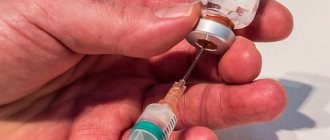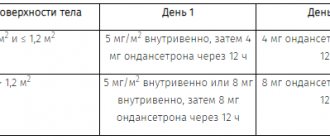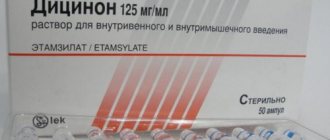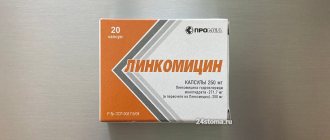Features of the composition and pharmacological action of Dexalgin
The components of one tablet are presented:
- dexketoprofen trometamol;
- corn starch;
- glycerol palmitostearate;
- microcrystalline cellulose;
- titanium dioxide;
- propylene glycol;
- sodium carboxymethyl starch;
- hypromellose;
- Macragol 600.
The injection solution contains a similar active ingredient, additional components are sodium chloride and hydroxide, ethanol, and purified water.
The medicine is included in the subgroup of NSAIDs; half an hour after use, a decrease in pain and temperature is noted. The drug has an anti-inflammatory effect. The maximum concentration of Dexalgin when taken orally occurs after 40 minutes, the half-life by the kidneys does not exceed 2 hours. With MK injections it is achieved after 10 minutes.
Contraindications and indications for Dexalgin therapy
The instructions recommend using tablets to relieve pain caused by:
- surgical interventions - in the postoperative period;
- radiculitis, algodismenorrhea;
- menstruation, dental diseases;
- neuralgia, sciatica;
- arthrosis, rheumatoid arthritis;
- osteochondrosis, spondyloarthritis;
- proliferation of metastases in bone tissue.
The solution in injections is prescribed when it is impossible to take Dexalgin orally - after injuries, operations, and with renal colic.
The drug is contraindicated in patients:
- with individual intolerance to the component composition;
- pathologies of the gastrointestinal tract, heart, liver and kidneys;
- bronchial asthma;
- undergoing anticoagulant therapy.
Dexalgin is not prescribed to minors, during pregnancy and breastfeeding.
Contraindications to the use of the drug Dexalgin injection
Dexalgin Injection should not be administered to patients with known hypersensitivity to dexketoprofen trometamol, other NSAIDs or other components of the drug; patients in whom substances with similar properties (for example acetylsalicylic acid or other NSAIDs) cause bronchospasm, acute rhinitis or lead to the development of nasal polyps, urticaria or angioedema; patients with peptic ulcer of the stomach or duodenum (including a history); patients with gastrointestinal bleeding, bleeding of other locations or a predisposition to hemorrhage; patients with Crohn's disease or ulcerative colitis; patients with a history of asthma; patients with severe uncontrolled heart failure; patients with moderate or severe renal impairment (creatinine clearance ≤50 ml/min); patients with severe liver dysfunction (10–15 points on the Child-Pugh scale); patients with hemorrhagic diathesis or other coagulation disorders, as well as those taking anticoagulants; during pregnancy and lactation.
Adverse reactions
During therapeutic procedures, non-standard effects may occur, manifested by:
- vomiting with nausea, high blood pressure;
- tachycardia, nettle fever, chills;
- redness, skin rashes, dermatitis;
- anemic and fainting states, cephalalgia;
- sleep disturbances, digestive disorders, bleeding.
Dexalgin tablets can cause discomfort in the epigastric area and heartburn. The injection solution causes pain and local temperature increase in the injection area, hematomas and inflammation.
The medicine must not be mixed with alcoholic beverages. Violation of the rules can provoke severe intoxication with clinical symptoms of poisoning.
Side effects
When using Dexalgin 25, various side effects may occur:
- Blurred vision and occasional tinnitus may occur.
- Very rarely, neutropenia and thrombocytopenia are possible.
- Infrequently, headache, dizziness, insomnia, or drowsiness may occur; Paresthesia is rarely possible.
- From the cardiovascular system: infrequently, a feeling of heat and redness of the skin may occur; Extrasystole rarely appears, blood pressure may increase, and cases of tachycardia or decreased blood pressure are very rare.
- From the respiratory system: bradypnea may rarely occur; cases of bronchospasm or shortness of breath are very rare.
- From the gastrointestinal tract: a feeling of nausea or vomiting, dyspepsia and diarrhea, abdominal pain may occur, constipation, flatulence, and dry mouth may occur infrequently. Rarely, erosions and ulcers may occur in the gastrointestinal tract, as well as bleeding from an ulcer or its perforation. Damage to the pancreas is very rare.
- From the liver and biliary tract: rarely, increased activity of liver enzymes may occur and jaundice may appear; very rarely the liver may be affected.
- From the genitourinary system: polyuria may rarely occur; cases of nephritis or nephrotic syndrome are very rare, disturbances in the menstrual cycle in women are rare, and in men, with long-term use, temporary dysfunction of the prostate gland may occur.
- From the musculoskeletal system: rarely, muscle spasms, back pain, and difficulty in the motor function of joints may occur.
- From the skin: infrequently - cases of dermatitis, rash; rarely the appearance of urticaria or acne, as well as sweating; very rarely, cases of severe skin reactions (such as Stevens-Johnson syndrome, Lyell's syndrome), as well as the occurrence of angioedema, allergic dermatitis and photosensitivity are possible.
- Cases of hypo- or hyperglycemia, as well as hypertriglyceridemia, are rare.
- Laboratory findings may (rarely) include ketonuria or proteinuria.
- General disturbances may include (infrequently) fever, fatigue; very rarely there is a possibility of anaphylactic shock and facial swelling.
- Rarely, aseptic meningitis can occur, mainly in patients with systemic lupus erythematosus, as well as mixed connective tissue diseases. Hematological disorders may also appear (purpura, anemia - both aplastic and hemolytic); the likelihood of agranulocytosis and bone marrow hypoplasia is very rare.
Overdose
Symptoms of overdose may include nausea, abdominal pain, headache or dizziness. Insomnia, disorientation, and anorexia may occur.
Treatment of overdose depends on the symptoms that appear. If necessary, gastric lavage and hemodialysis are allowed.
The nuances of taking Dexalgin
The instructions draw attention to the following rules for using tablets:
- the dosage is calculated by the doctor individually;
- a single dose is 0.5-2 tablets (25 mg each), procedures are performed 2-6 times a day;
- the maximum daily volume of medication cannot exceed 3 tablets;
- The duration of therapy is 5 days.
The injection solution is prescribed according to a specific scheme:
- intramuscular administration - 2 ml slowly, every 8-12 hours, 50 mg, daily dosage does not exceed 0.15 g, treatment lasts for 2 days;
- intravenous – carried out according to the dosages of intramuscular treatment, the medication is administered for about 15 seconds;
- drip – 2 ml of the drug is diluted in 100 ml of physiological solution, the dropper is placed for 15-30 minutes.
Accidentally taking an excess amount of medication provokes sleep disturbances, problems with orientation in space, cephalgia, and nausea. In case of intoxication, symptomatic therapy is used.
Features of interaction
The abstract draws attention to the following nuances of joint therapy with Dexalgin:
- an increased risk of bleeding occurs when using anticoagulants, NSAIDs, Heparin, Ticlopidine, Citalopram, Fluoxetine, Sertraline;
- danger of toxic effects on the body - when treated with lithium preparations, Methotrexate, sulfonamides;
- prohibition on combination with cardiac glycosides, thrombolytics, quinolones without supervision by the attending physician;
- The development of acute renal failure can be provoked by diuretics and ACE inhibitors.
The injection solution must not be mixed in the same syringe with individual medications, the list includes: Pethidine, Hydroxyzine, Dopamine, Promethesine, Pentazocine.
Dexalgin®
Undesirable side effects can be minimized by using the drug in the lowest effective dose with the minimum duration of use necessary to relieve pain.
Gastrointestinal disorders
Erosive and ulcerative lesions of the gastrointestinal tract, gastrointestinal bleeding or perforation (in some cases, fatal) were observed with the use of any NSAIDs at different stages of treatment and regardless of the presence of characteristic symptoms or a history of serious gastrointestinal pathology. If gastrointestinal bleeding or ulcerative lesions occur, use of Dexalgin® should be discontinued.
The risk of serious gastrointestinal complications increases with increasing doses of NSAIDs in elderly patients. Elderly patients have a higher incidence of side effects, especially gastrointestinal bleeding and perforation, which can be fatal. In this category of patients, the maximum daily dose is 50 mg (see section “Dosage and Administration”).
As with any NSAID, it is necessary to ascertain the patient's history of esophagitis, gastritis and/or peptic ulcers before prescribing treatment with dexketoprofen. Patients with gastrointestinal symptoms or a history of gastrointestinal disease should be monitored for the occurrence of digestive disorders, especially gastrointestinal bleeding.
The simultaneous administration of gastroprotectors (misoprostol or proton pump blockers) is recommended for such patients, as well as patients who require the simultaneous use of low doses of acetylsalicylic acid or other drugs that increase the risk of gastrointestinal complications (see section “Interaction with other drugs”).
Patients with a history of gastrointestinal drug toxicity, especially elderly patients, should report any gastrointestinal symptoms (especially bleeding), especially during initiation of therapy.
Patients concomitantly taking corticosteroids, antiplatelet agents (for example, aspirin) or anticoagulants (for example, warfarin), selective serotonin reuptake inhibitors should be under close medical supervision, as they have an increased risk of gastrointestinal bleeding.
Kidney disorders
Caution should be exercised in patients with impaired renal function. The use of NSAIDs may lead to deterioration of renal function, fluid retention and edema.
Caution should be exercised when using Dexalgin® in patients concomitantly taking diuretics and patients who may develop hypovolemia, due to the increased risk of nephrotoxicity.
Like other NSAIDs, Dexalgin® can lead to increased concentrations of creatinine and nitrogen in the blood plasma.
Like other prostaglandin synthesis inhibitors, Dexalgin® may have side effects on the urinary system, which can lead to the development of glomerulonephritis, interstitial nephritis, papillary necrosis, nephrotic syndrome and acute renal failure.
When using the drug Dexalgin®, it is necessary to consume a sufficient amount of fluid to prevent the development of dehydration and possible toxic effects on the kidneys. Renal dysfunction is more likely in elderly patients (see section "Dosage and Administration").
Liver disorders
Caution must be exercised when using Dexalgin® in patients with impaired liver function. As with the use of other NSAIDs, during therapy with Dexalgin®, a slight transient increase in laboratory parameters characterizing liver function and a significant increase in the activity of aspartate aminotransferase (AST) and alanine aminotransferase (ALT) may be observed. In case of a significant increase in the corresponding indicators, the use of the drug Dexalgin should be discontinued. Elderly patients are more likely to develop liver problems.
Cardiovascular and cerebrovascular complications
Before starting to use Dexalgin® in patients with arterial hypertension and/or mild to moderate heart failure, caution should be exercised and consult a doctor, since in this category of patients the use of NSAIDs can lead to fluid retention, edema and increased blood pressure .
Clinical studies and epidemiological data suggest that NSAIDs, especially in high doses and with long-term use, may lead to a slight increase in the risk of acute myocardial infarction or stroke. There is insufficient data to exclude the risk of these events when using dexketoprofen.
In patients with uncontrolled arterial hypertension, coronary heart disease (CHD), congestive heart failure, peripheral arterial disease and/or cerebrovascular disease, Dexalgin® should be used with caution.
A similar approach is applicable to patients with risk factors for cardiovascular disease (eg, hypertension, hyperlipidemia, diabetes mellitus, smoking).
All non-selective NSAIDs can inhibit platelet aggregation and prolong bleeding time by inhibiting prostaglandin synthesis. In this regard, the use of Dexalgin® in patients simultaneously taking drugs that affect the hemostatic system, such as warfarin, coumarin derivatives and heparins, is not recommended.
If the doctor decides on long-term use of dexketoprofen, monitoring of peripheral blood parameters and the functional state of the liver and kidneys is necessary.
Elderly patients
Elderly patients are especially susceptible to adverse reactions when using NSAIDs, including the risk of life-threatening gastrointestinal bleeding and perforation, and decreased renal, liver, and cardiac function. When using the drug Dexalgin® in this category of patients, proper clinical monitoring is necessary.
Elderly patients should take Dexalgin® starting with a lower dose (maximum daily dose is 50 mg). If well tolerated, doses recommended for the general population may be used.
There is evidence of rare cases of severe skin reactions (such as exfoliative dermatitis, Stevens-Johnson syndrome, toxic epidermal necrolysis), including death, with the use of NSAIDs.
It is assumed that the greatest risk of developing toxic skin reactions exists during the initial period of therapy, since in most cases the development of skin reactions was noted during the first month of treatment. At the first manifestations of a skin rash, damage to the mucous membranes or other signs of an allergic reaction, the use of the drug Dexalgin® should be stopped immediately.
In very rare cases, severe hypersensitivity reactions (eg anaphylactic shock) have been observed. If the first signs of a hypersensitivity reaction appear, use of the drug Dexalgin should be stopped and consult a doctor. Depending on the severity of symptoms, the patient should receive specialized medical care.
Like other NSAIDs, dexketoprofen may mask the symptoms of infectious diseases. If signs of infection or deterioration in health are detected while using the drug Dexalgin®, the patient should immediately consult a doctor.
In very rare cases, severe soft tissue skin infections may occur during a chickenpox infection. The use of Dexalgin® for chickenpox should be avoided.
The drug Dexalgin® contains sucrose, therefore patients with hereditary fructose intolerance, sucrase-isomaltase deficiency and glucose-galactose malabsorption syndrome should not take the drug Dexalgin®.
The use of Dexalgin® may adversely affect female fertility and is not recommended for women planning pregnancy. In women who have problems conceiving or are undergoing examination for infertility, it is necessary to consider the possibility of discontinuing the drug Dexalgin®.
Analogs
If side effects or signs of intolerance to Dexalgin appear, the drug must be replaced with a suitable remedy. The list of analogues is presented:
- Depiofen, Brufen, Bofen;
- Vimovo, Brustan, Dexifen;
- Zo-tek, Ibuprex, Ibuprom;
- Ibunorm, Ibufen, Ibuprofen;
- Ibutard, Imet, Ketonal, Ivalgin;
- Irfen, Naproff, Majezik-sanovel;
- Novigan, Nurofen, Nurosan, Faspik, Promax.
The cost of the original and replacements may vary significantly.
Terms of sale and storage
Dexalgin is sold in pharmacies only with a doctor's prescription. The drug is stored in dark rooms at temperatures up to 25 degrees. The medicine is suitable:
- tablets - for 2 years, after expiration of the period they are disposed of together with household waste;
- solution in ampoules - up to 5 years; after preparation, the medicine retains its properties for no more than one day (provided the temperature is from 3 to 9 degrees and in a dark place).
Dexalgin in ampoules costs from 265 rubles, the price of tablets depends on the number of units in the package and starts from 279 rubles.
Note!
The description of the drug Dexalgin on this page is a simplified author’s version of the apteka911 website, created on the basis of the instructions for use.
Before purchasing or using the drug, you should consult your doctor and read the manufacturer's original instructions (attached to each package of the drug). Information about the drug is provided for informational purposes only and should not be used as a guide to self-medication. Only a doctor can decide to prescribe the drug, as well as determine the dose and methods of its use.



